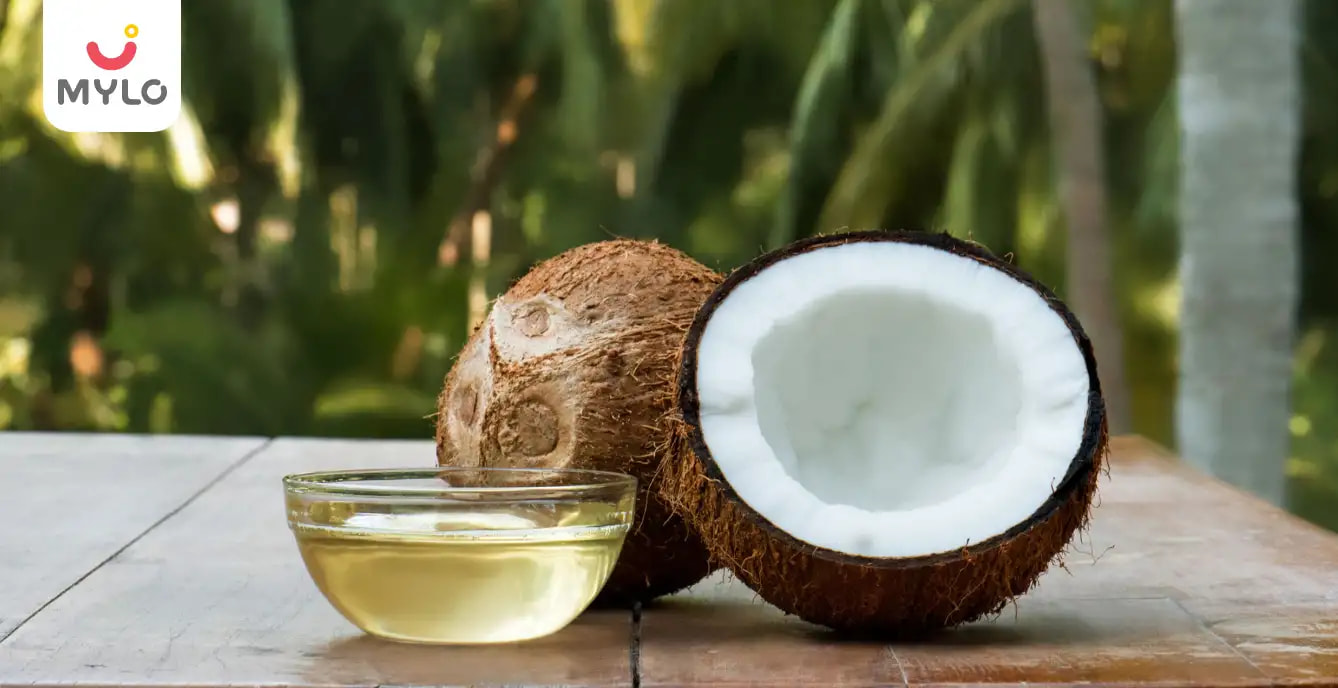Home

Sex Life

Can We Use Coconut Oil as Lubricant: Pros, Cons and Best Practices
In this Article

Sex Life
Can We Use Coconut Oil as Lubricant: Pros, Cons and Best Practices
Updated on 14 November 2023
Coconut oil has gained popularity for its versatile uses, from cooking to skincare. However, its potential as a personal lubricant has sparked both curiosity and debate. In this article, we delve into the question- can we use coconut oil as lubricant, examining its benefits, drawbacks, and best practices.
Can coconut oil be used as a lubricant?
Many people wonder whether coconut oil can be used as a lubricant, especially given its natural properties and reported benefits. Coconut oil's composition sets it apart from conventional water-based or silicone-based lubricants. While it offers natural lubrication and moisturization, it may not be compatible with certain types of condoms, potentially compromising their integrity and effectiveness.
Additionally, the presence of fragrances or additives in some commercial coconut oil products may cause irritation or allergic reactions in sensitive individuals. Couples seeking to conceive may consider using coconut oil as a natural alternative to conventional lubricants, but it's crucial to evaluate its impact on fertility and sperm viability.
Is it safe to use coconut oil as lubricant when trying to conceive?
When considering the use of coconut oil as a lubricant for conception, it's important to assess its potential impact on fertility and sperm viability. While coconut oil is prized for its natural properties and moisturizing effects, its compatibility with sperm motility and fertility requires careful evaluation.
Research on the effects of coconut oil as a lubricant on sperm function is limited, and the available evidence may not provide conclusive insights into its impact on fertility outcomes. Some studies suggest that coconut oil may have a neutral or potentially beneficial effect on sperm motility and viability, particularly compared to certain commercial lubricants that can impair sperm function.
However, the specific implications of using coconut oil as a lubricant when trying to conceive may vary based on individual factors and fertility considerations.
You may also like: Do Antibiotics Affect Fertility: Debunking Common Myths and Misconceptions
What are the benefits of coconut oil as lubricant?
Let us now understand the benefits of using coconut oil as lube:
1. Natural Moisturization
Coconut oil offers natural moisturizing properties, potentially enhancing comfort and reducing friction during intimate activities.
2. Non-Irritating
Pure, unrefined coconut oil is free from added fragrances and additives, minimizing the risk of irritation or allergic reactions for individuals with sensitive skin.
3. Versatility
In addition to its use as a sexual lubricant, coconut oil can serve multiple purposes, such as skincare and massage, adding value and convenience.
4. Potential Sperm-Friendly Properties
Some evidence suggests that coconut oil may have a neutral or favorable impact on sperm motility, making it a potentially fertility-friendly lubricant.
5. Natural Ingredients
Coconut oil is derived from natural sources, appealing to individuals seeking organic and chemical-free alternatives for personal care and intimacy.
What are the side effects of coconut oil as lube?
Here are some potential drawbacks of using coconut oil as a lubricant:
1. Condom Incompatibility
Certain types of condoms, particularly latex and polyurethane varieties, may not be compatible with coconut oil, potentially increasing the risk of breakage or failure.
2. Potential Allergic Reactions
Individuals with allergies to coconut oil or related botanical substances may experience skin irritation or allergic reactions upon intimate use.
3. Limited Longevity
Coconut oil may require reapplication during extended intimate sessions, as its natural composition may not provide prolonged lubrication compared to some synthetic alternatives.
4. Staining and Cleanup
Coconut oil may leave stains on fabrics and bedding, necessitating thorough cleaning and maintenance to prevent residual marks and odors.
5. Risk of Bacterial Imbalance
While coconut oil has antimicrobial properties, its use as a lubricant may disrupt vaginal flora in some individuals, potentially impacting vaginal health and microbial balance.
You may also like: How To Make Sperm Stronger For Pregnancy
How to use coconut oil as lube?
Let us now understand how can coconut oil be used as a lubricant:
1. Selecting the Right Type of Coconut Oil
Choose a high-quality, unrefined coconut oil without added fragrances or ingredients, ensuring purity and minimal risk of adverse reactions.
2. Patch Test
Perform a small patch test on a discreet area of the skin to assess for any allergic reactions or sensitivity to coconut oil.
3. Preparation
Warm the coconut oil to a comfortable temperature, ensuring that it is in liquid form for ease of application and spreadability.
4. Application
Apply a small amount of coconut oil to the desired intimate areas, gradually increasing the quantity based on personal preference and comfort.
5. Reapplication
Be prepared to reapply coconut oil as needed during intimate activities, maintaining adequate lubrication and minimizing discomfort.
6. Cleanup
After use, gently cleanse the intimate areas and any surfaces exposed to coconut oil, ensuring thorough removal to prevent lingering residue and potential staining.
You may also like: The Ultimate Guide to Choosing Between Male and Female Condoms
The Bottomline
The answer to the question can we use coconut oil as lubricant depends on a careful consideration of its benefits, drawbacks, and potential implications for intimate health and fertility. While coconut oil offers natural moisturizing properties and potential advantages as a lubricant, it also presents certain limitations and risks that individuals should weigh when making an informed choice. Consulting with a healthcare provider or sexual health specialist can provide personalized guidance and recommendations based on individual needs and considerations.

Coconut Oil - 200 ml
Reduces Dandruff | Strengthens Hair | Soothes Baby's Rashes
₹ 294

4.5
(6240)


42974 Users bought



Written by
Anandita Sharma
Drawing on more than a decade of expertise in administration, Anandita Sharma currently serves as a content operations e
Read MoreGet baby's diet chart, and growth tips

Related Articles
Related Questions
Influenza and boostrix injection kisiko laga hai kya 8 month pregnancy me and q lagta hai ye plz reply me

Hai.... My last period was in feb 24. I tested in 40 th day morning 3:30 .. That is faint line .. I conculed mylo thz app also.... And I asked tha dr wait for 3 to 5 days ... Im also waiting ... Then I test today 4:15 test is sooooo faint ... And I feel in ma body no pregnancy symptoms. What can I do .

Baby kicks KB Marta hai Plz tell mi

PCOD kya hota hai

How to detect pcos

RECENTLY PUBLISHED ARTICLES
our most recent articles

From the Nutritionist
Feeding Tips and Healthy Food Ideas for Your 7-9 Month Old Baby

Pregnancy Journey
Sweet Potato During Pregnancy: Benefits, Risks & Side Effects

Diet & Nutrition
Carrot During Pregnancy: How This Healthy Snack Can Help You and Your Baby

Pregnancy Journey
30+ Maternity Photoshoot Props: Accessories for Maternity Photoshoot

Diapering
Diaper Pants 101: Everything You Need to Know Before You Buy

Diet & Nutrition
Can We Eat Curd During Periods: Understanding the Dairy Dilemma
- Sabja Seeds During Pregnancy: Benefits & Side Effects
- Newborn Diaper Rash: Causes, Treatment and Prevention Tips
- New Born Baby Diapers: Understanding the Quantity and Sizing Needs of Your Little One
- The Ultimate Guide to Supplementing with Omega 3 for PCOS
- The Ultimate Guide to Safe and Effective Exercise in Periods
- PCOS Hair Growth: Causes, Symptoms, and Effective Treatment Options
- Endometrial Hyperplasia: The Ultimate Guide to Understanding Its Causes and Treatment
- Lights, Camera, Baby Bump: Movies to Watch During Pregnancy
- Squat During Pregnancy Benefits & Precautions
- The Ultimate Guide to Thyroid Treatment in Ayurveda
- Ayurvedic Treatment for Acne: Holistic Healing for Clear Skin
- Gokshuradi Guggulu: Ayurveda's Solution for UTI and Kidney Support
- The Surprising Benefits of Dark Chocolate for Periods
- How to Reduce Air Pollution in Your Daily Life


AWARDS AND RECOGNITION

Mylo wins Forbes D2C Disruptor award

Mylo wins The Economic Times Promising Brands 2022
AS SEEN IN
















- Mylo Care: Effective and science-backed personal care and wellness solutions for a joyful you.
- Mylo Baby: Science-backed, gentle and effective personal care & hygiene range for your little one.
- Mylo Community: Trusted and empathetic community of 10mn+ parents and experts.
Product Categories
baby carrier | baby soap | baby wipes | stretch marks cream | baby cream | baby shampoo | baby massage oil | baby hair oil | stretch marks oil | baby body wash | baby powder | baby lotion | diaper rash cream | newborn diapers | teether | baby kajal | baby diapers | cloth diapers |




